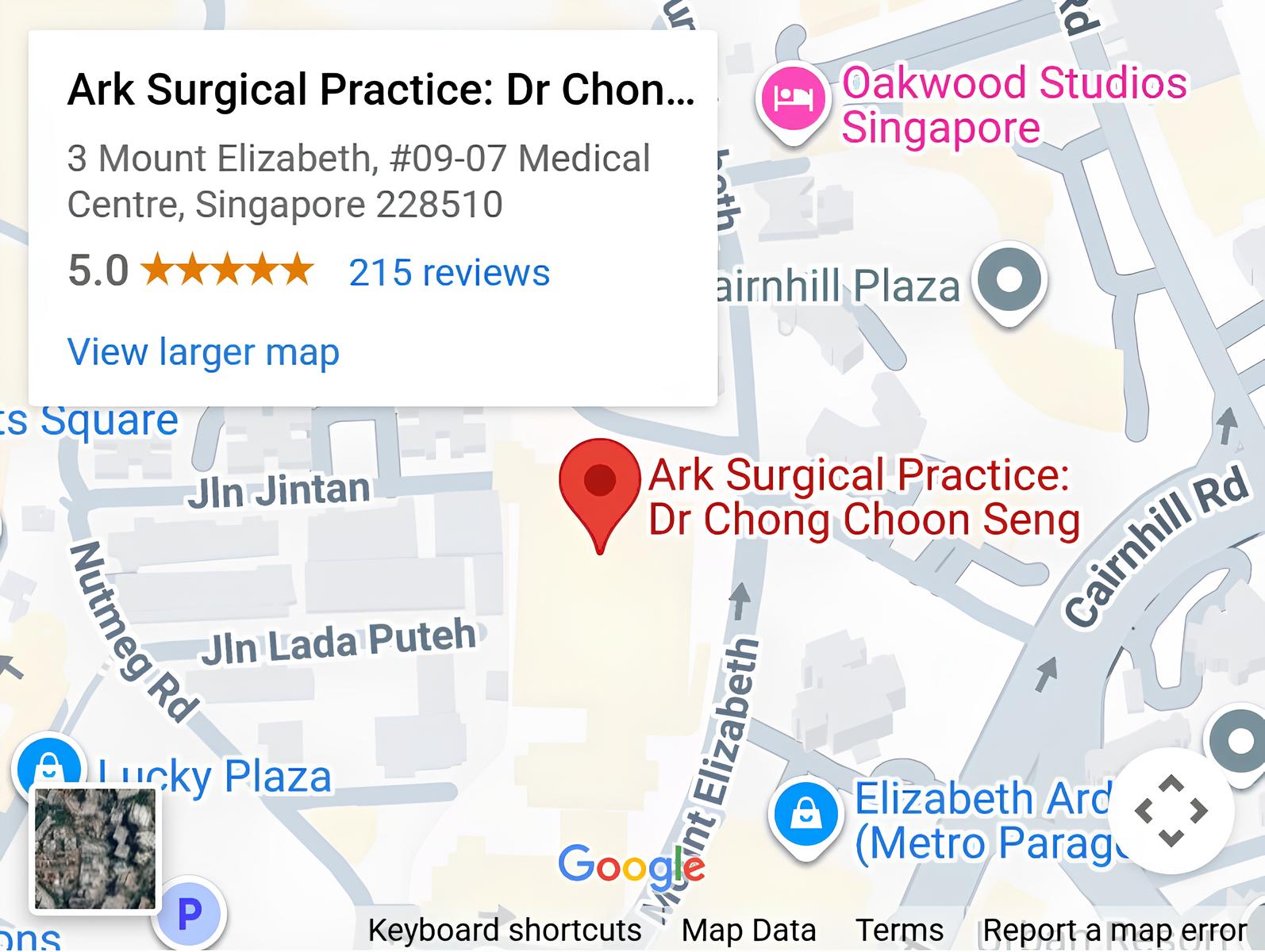- Long-term Resolution: Complete removal of problematic haemorrhoids reduces the likelihood of recurrence compared to other treatments.
- Symptom Relief: Surgery eliminates bleeding, pain, and discomfort associated with severe haemorrhoids.
- Improved Hygiene: Removal of enlarged tissue makes maintaining anal hygiene easier and more effective.
- Single Treatment: Unlike repeated non-surgical procedures, haemorrhoidectomy typically requires only one intervention and offers symptom relief for a longer period of time.
Piles Surgery in Singapore
Piles surgery is a surgical procedure performed to address haemorrhoids – swollen and inflamed blood vessels located in and around the anus. This surgery is typically considered when other treatments, such as dietary adjustments, medications, or minimally invasive techniques, have not successfully alleviated symptoms. The procedure involves the precise removal of the affected vascular tissue to relieve discomfort and improve quality of life.




Indications for Piles Surgery
Several symptoms and conditions may lead to considering surgical intervention for haemorrhoids. These include:
- Persistent Bleeding: Regular bleeding during bowel movements, particularly when conventional treatments have not resolved the issue.
- Grade 3-4 Haemorrhoids: Internal haemorrhoids that protrude through the anus and either need manual reduction or cannot be pushed back.
- Chronic Pain: Constant discomfort and pain that interferes with daily activities and has not responded to conservative management.
- Strangulation: Haemorrhoids that have their blood supply cut off, causing severe pain and potential tissue death.
Benefits of Piles Surgery In Singapore
Surgical removal of haemorrhoids offers several advantages for patients with severe or chronic symptoms.
Surgical Methods
Different surgical techniques may be employed based on the location, size, and severity of haemorrhoids.
Conventional Haemorrhoidectomy
This open surgical technique involves making incisions around the anus to remove the haemorrhoids. The wounds are left open to heal naturally, which helps prevent post-operative stenosis and allows for proper drainage.
Closed Haemorrhoidectomy
This technique involves excising the haemorrhoidal tissue and closing the wounds with absorbable sutures. It may offer faster healing but carries a slightly higher risk of post-operative infection.
Stapled Haemorrhoidopexy
Using a circular stapling device, this procedure lifts and removes a ring of excess tissue above the haemorrhoids and staples the remaining tissue in place. This technique typically causes less post-operative pain but may not be suitable for external haemorrhoids.
Ligasure Haemorrhoidectomy
This method uses a specialised device that seals blood vessels with electrical energy before cutting the tissue. The procedure typically results in less bleeding and may reduce operating time compared to conventional techniques.
Laser Hemorrhoidoplasty
This method is a new and novel approach that seals congested blood vessels with a laser probe. It is often combined with a suture pexy procedure which addresses larger prolapsing hemorrhoids. It typically causes less post operative pain and is safe.
Preparing For Piles Surgery
Medical Assessment
A physical examination, blood tests, and coagulation profile help determine fitness for piles surgery in Singapore. Additional cardiac or respiratory evaluations may be needed for patients with pre-existing conditions.
Medication Review
Blood-thinning medications often need to be stopped 5-7 days before surgery. Patients should provide a complete list of current medications, including supplements and herbal remedies.
Fasting Guidelines
Avoid consuming any food for 6 to 8 hours before the surgery to reduce anaesthesia-related complications. Clear fluids, such as water, may be permitted up to 2 hours prior to the procedure.
Bowel Preparation
A clear liquid diet is typically required 24 hours before surgery. Patients may need to use enemas or take oral laxatives to empty the bowels completely.
Step-by-Step Procedure
Anaesthesia and Monitoring
The procedure begins with the administration of either general anaesthesia (to put you to sleep) or spinal anaesthesia (to numb the lower half of your body). Throughout the surgery, the anaesthetist closely monitors your vital signs, including heart rate, blood pressure, and oxygen levels, to ensure your stability.
Tissue Assessment and Visualisation
The surgeon examines the anal area to accurately identify the location and severity of the haemorrhoids. A proctoscope, a specialised instrument, may be used to provide a clearer view and better access to the affected tissues.
Haemorrhoid Excision
The haemorrhoids are carefully separated from the underlying muscle to prevent damage to surrounding structures. Blood vessels supplying the haemorrhoids are sealed to minimise bleeding, and the excess swollen tissue is removed using specialised surgical instruments.
Wound Care and Closure
Depending on the surgical technique used, the wounds may be left open to heal naturally or closed with dissolvable stitches to promote quicker recovery. The area is treated with an antibiotic ointment to prevent infection, and a dressing is applied for protection and comfort.
Are Your Symptoms Affecting Your Quality of Life?
Consult our MOH-accredited specialist for an accurate diagnosis & personalised treatment plan today.

Post-Surgical Care and Recovery
- Immediate Post-operative Care: During the first 24 hours after surgery, patients are closely monitored to ensure stable vital signs, effective pain control, and proper urination. Starting with clear fluids helps assess tolerance to intake before gradually transitioning to a normal diet as the body adjusts.
- Pain Management: Regularly scheduled pain medications are provided to manage discomfort. In addition, applying ice packs to the surgical area can help reduce swelling and offer extra relief between doses of medication.
- Resuming Activities: Light activities, such as walking short distances, are typically encouraged within a few days to promote circulation and reduce the risk of complications. Most patients can return to work within 1 to 2 weeks, depending on the nature of their job. However, strenuous activities, especially heavy lifting, should be avoided for 4 to 6 weeks to allow proper healing.
- Bowel Management: To prevent constipation, which can strain the surgical area, a high-fibre diet combined with adequate fluid intake is recommended. Stool softeners or gentle laxatives may also be prescribed to ease the first few bowel movements, ensuring minimal discomfort and protecting the surgical site.
Potential Risks and Complications
Like any surgical procedure, piles surgery in Singapore carries specific risks. These include urinary retention, which may require temporary catheterisation, and bleeding that typically occurs 7-14 days after surgery when scabs separate. Infection affects a small percentage of patients and usually responds well to antibiotics. Some patients may experience temporary difficulty controlling gas, while anal stenosis (narrowing) occurs rarely. Anal fistula formation, which involves an abnormal connection between the anal canal and surrounding tissue, or incontinence are uncommon but possible complications.
Frequently Asked Questions
Are there non-surgical alternatives to piles surgery?
Yes, less severe haemorrhoids can be treated with rubber band ligation, sclerotherapy (injections to shrink haemorrhoids), or Haemorrhoidal Energy Treatment (HET coagulation). These options are not typically effective for advanced cases.
Is there a risk of haemorrhoids recurring after surgery?
The recurrence rate is low, especially with lifestyle changes such as a high-fibre diet, adequate hydration, and avoiding straining during bowel movements. Regular exercise and healthy bowel habits further reduce the risk.
Can haemorrhoidectomy affect my ability to control bowel movements?
Temporary issues with controlling gas or stool may occur during recovery, but these usually resolve. Permanent incontinence is very rare.
How do I know if I need piles surgery in Singapore?
If you’re experiencing persistent pain, bleeding during bowel movements, or haemorrhoids that keep coming back despite medication or non-surgical treatments, you may be a candidate for piles surgery. A colorectal specialist in Singapore can assess the severity and recommend the most appropriate treatment.
Is piles surgery in Singapore covered by insurance or Medisave?
Yes, most piles surgery procedures in Singapore are Medisave-claimable and may be covered by Integrated Shield Plans or corporate health insurance. Coverage will depend on your policy and medical condition.
How long is the downtime after piles surgery?
Most patients resume normal daily activities within 1 to 2 weeks. However, full recovery may take up to 4–6 weeks. During this time, you’ll need to avoid heavy lifting and maintain a high-fibre diet.
What are the risks of not treating severe haemorrhoids?
Untreated advanced haemorrhoids can lead to chronic bleeding, anaemia, severe pain, infection, or even strangulation of the haemorrhoid. In rare cases, complications like abscesses or fistulas may develop.
Can hernias and piles occur together?
Although unrelated in cause, some patients may suffer from both hernias and piles due to increased intra-abdominal pressure from chronic straining, constipation, or heavy lifting. Addressing both conditions may improve long-term outcomes and quality of life.
How are piles different from anal fistulas or abscesses?
Piles are swollen veins, whereas anal fistulas and abscesses involve infections or tunnels near the anus. These conditions often require different forms of transanal surgery or drainage procedures. A proper diagnosis is key to avoiding complications from misdiagnosis.
What if my symptoms are not caused by piles but another gastrointestinal issue?
Some patients experience bloating, pain, or rectal discomfort that may be due to other gastrointestinal disorders such as irritable bowel syndrome, infections, or polyps. A detailed consultation can help clarify the diagnosis and determine the most appropriate treatment.
Do I need a colonoscopy before piles surgery?
In some cases, especially if there is unexplained bleeding or a family history of colorectal cancer, your surgeon may recommend a colonoscopy to rule out other underlying conditions. This helps ensure that the correct cause of symptoms is identified before proceeding with surgery.
Can haemorrhoids be mistaken for other anorectal disorders?
Yes, haemorrhoids can present with symptoms similar to other anorectal conditions such as anal fissures, fistulas, or abscesses. If you are experiencing rectal bleeding, pain, or lumps, it’s important to undergo a thorough evaluation.
Partnered Programmes & Insurance Plans
For Singaporeans, Singapore Permanent Residents and Foreigners. Please speak to our friendly clinic staff about using your insurance plans.

















contact us
Please leave us a message and our friendly clinic staff will get back to you as soon as possible. For urgent or same day appointments, kindly call the clinic to arrange an appointment.
Our Clinic Locations
Ark Surgical Practice – Mount Elizabeth Medical Centre
3 Mount Elizabeth, #09-07
Singapore 228510
Monday to Friday: 9am – 5pm
Saturday: 9am – 12:30pm
Sunday & Public Holidays: Closed
Ark Surgical Practice – Mount Alvernia Hospital
820 Thomson Road,
Mount Alvernia Hospital, #06-52,
Medical Centre D, Singapore 574623
Wednesday: 9am – 12:30pm
Thursday: 2pm – 5pm








